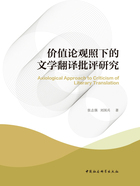
Preface
Ever since the 1980s postmodernism has greatly influenced the field of Translation Studies.As a result,traditional philologist and structuralist paradigms were marginalized.Various cultural approaches offered various,sometimes conflicting,criteria for criticizing literary translation,and some of them with radical individual constructivism and deconstructionism as their philosophical foundations have almost made “translation criteria” a meaningless term.Translation has thus been made a “free play” of translators and readers as meaning has become indeterminate and “anything goes”.The plurality of criteria has brought forth people's doubt about the scientificity and objectivity of any criticism of literary translation.It has put the study of criticism of literary translation at stake,making us rethink about our previous approaches.Inspired by Lv Jun's axiological-oriented approach to translation criticism,the authors of this book turn to evaluation theories and axiology in general in order to get more insights into criticism of literary translation.
The authors first gave a detailed review of the previous studies of translation criticism and criticism of literary translation in light of paradigm and system theories,finding that difference among the existing paradigms and sub-paradigms mainly stems from people's different understandings of the nature of translation,the essence of literariness and different outlooks of value.
Based on their introduction and discussion of evaluation theories and axiology in general and in light of evaluation theories of social constructivism,the authors gave a detailed analysis of those main factors of criticism of literary translation,including the nature of criticism of literary translation,the objectives,the classification,the properties,the principles,the criteria,the methodology and so on.
Our studies show that the essence of criticism is evaluation and literary translation and criticism of literary translation are forms of human practice to create values.The object of our criticism of literary translation is the value relationship between the subject and the object.Criticism of literary translation cannot be separated from epistemology as to pass on reasonable value judgment,we have to know the subject and the object and their relationship.Axiological approach to criticism of literary translation holds a dialectical view on the subjectivity and objectivity.It does not deny there is subjectivity and relativity in criticism,but is strongly against the dogma of “anything goes” and absolute relativism.Though criteria for criticism are context dependent,they are nevertheless fixed in a specific context.Though criteria are pluralistic,there is still objectivity in them as they are determined by the needs of the subject which are both subjective and objective.The objectivity lies in the constraints of the objective laws of things(texts)and the objective laws of social development on the subject.Axiological-oriented criticism of literary translation is practical-oriented,reflexive and constructive.It is not confined to the judgment of what Is,but rather,emphasizes the judgment of what Ought to be,seeking a proper combination of description and prescription.This book discusses in detail issues such as translation criteria,criteria for translation criticism,the maximal criteria,the minimal criteria,judgment of ethic and politic values,intellectual value and aesthetic value of literary translation etc.offering a fairly systematic framework for criticism of literary translation and expounding the significance of meta-criticism for the development of studies on criticism of literary translation.It is hoped that this book can attract readers majoring or interested in foreign languages,Translation Studies,literature and comparative literature alike,offering them some new ideas concerning literature and criticism of literary translation.